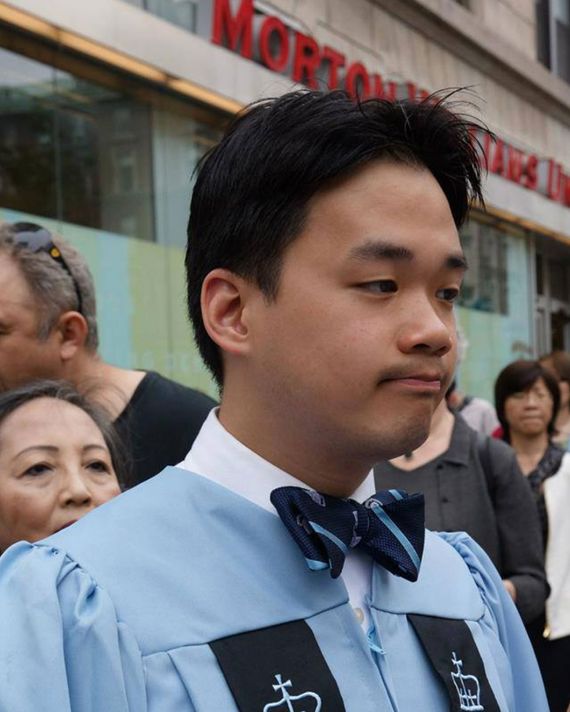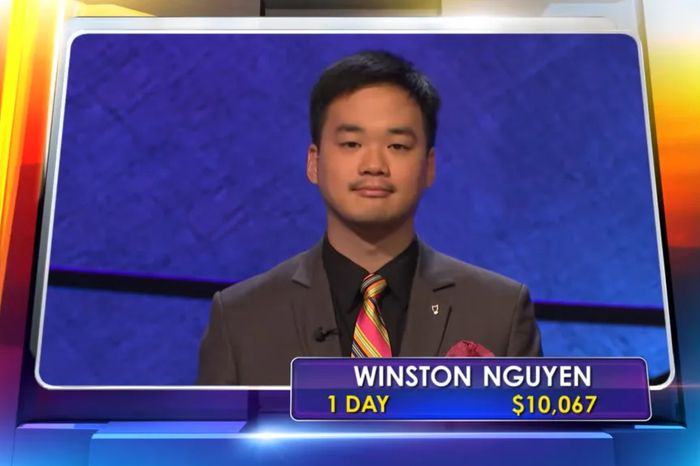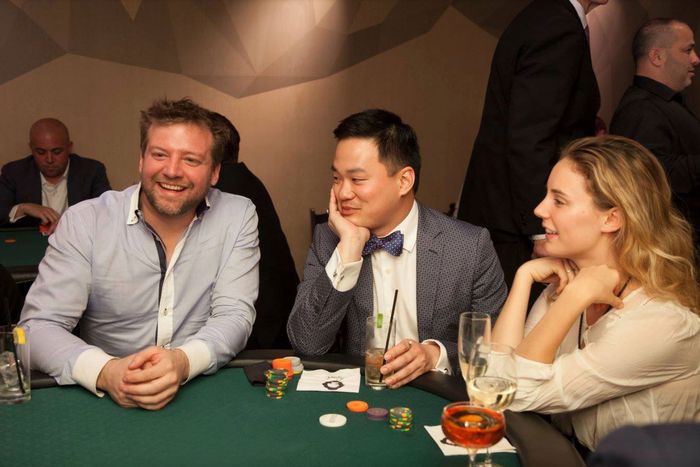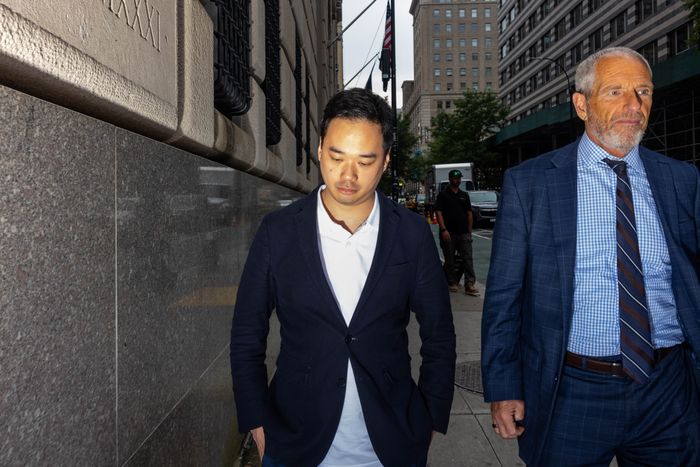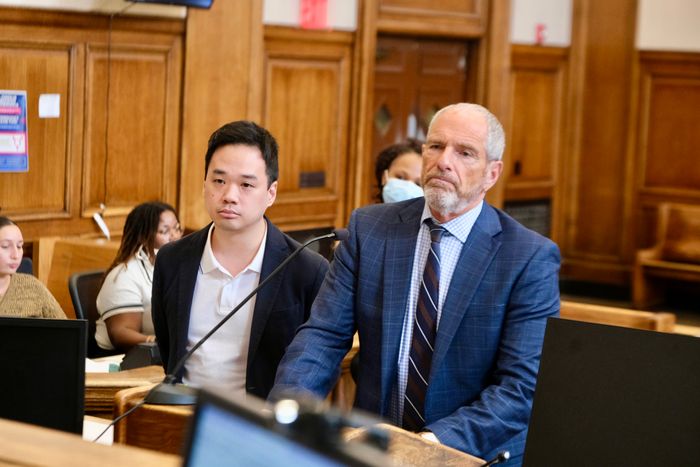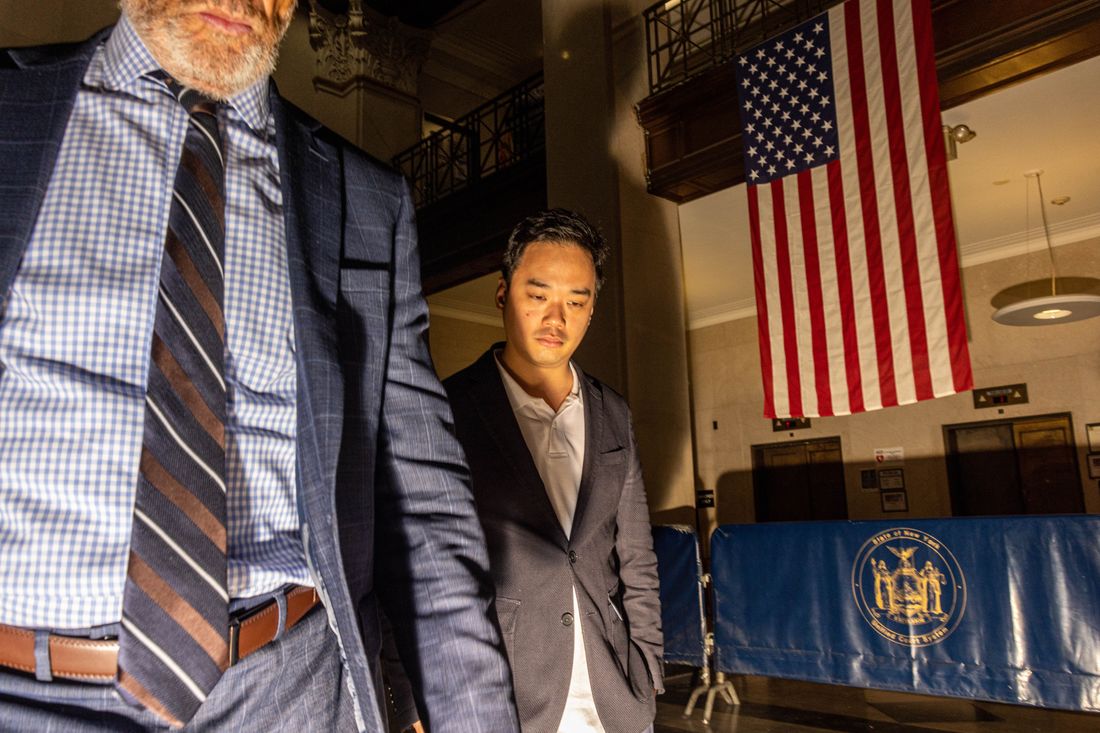
This article was featured in One Great Story, New York’s reading recommendation newsletter. Sign up here to get it nightly.
The texts started coming in right after the arrest, a symphony of vibrations in the pockets and Rachel Comey fanny packs of Brooklyn’s private-school set. Students messaged their friends and parents, who in turn formed frantic group chats with other parents. The details were fuzzy on June 6, but what they knew for sure was this: Winston Nguyen, a math teacher at Saint Ann’s School, where parents pay up to $60,525 a year for a nontraditional, grades-free education that might one day gain their kids entry to Brown or Harvard, had been arrested in front of students.
Six weeks later, Nguyen, 37, was charged with 11 felony counts, accused by prosecutors of posing as a teen and fellow student on Snapchat, where he allegedly asked children at Saint Ann’s and three other Brooklyn private schools to send him nude, sexual images. Had this been Nguyen’s first felony, an unforeseeable, unpreventable incident that caught the school off guard, the reaction from parents might have been more shock than blind outrage. But they had been uneasy since finding out years earlier that Nguyen once served a prison sentence for fraud long before Saint Ann’s, knowing full well of his criminal past, had hired him. Not only did school leadership brush off parents when they expressed concerns, parents say, but administrators allowed Nguyen to work as a private tutor for students and moved him from office administration to the classroom, despite the fact that he had never worked as a teacher and did not have professional experience in mathematics. Nguyen, as it would turn out after his arrest, had a long history of deception prior to his conviction: He’d conned roommates, friends, and his own family.
Saint Ann’s is known as an artsy, bohemian alternative to the elite private schools across the East River — with just as much social clout (it’s popular among celebrities, and alumni include Jean-Michel Basquiat, Lena Dunham, Zac Posen, and Jennifer Connelly) and academic prestige (a quarter of this year’s graduating class is going on to an Ivy League university). Parents say they feared interrogating leadership about Nguyen could be interpreted as their clashing with the school’s liberal bent, and none of the 12 interviewed for this article would speak with their names attached, out of fear that they would upset the administration or get canceled by other parents for breaking ranks.
For parents tired of walking on eggshells, Nguyen’s arrest was a turning point. They wrote letters demanding that anyone still at the school who was responsible for hiring Nguyen be fired. The staggering reality they’re now faced with is that Saint Ann’s wasn’t conned. The school deliberately exposed students to a criminal and misled parents and faculty when it claimed to have done its due diligence: Nguyen was not caught lying about two of the schools he claimed to have worked at previously.
What remains is not only the damage Nguyen allegedly inflicted on his young students and their families but an institution and a community in crisis. An unwritten contract between parents and the school is that the former will stay at arm’s length, putting faith in administrators and teachers to educate their kids without much interference. There’s no PTA, and the oft-repeated saying is that as a parent, you “drop your kids off at kindergarten and pick them up at graduation.” As some parents talk about pulling their kids out of the school and others call for an independent investigation, they all are asking the same question: How did the school they had entrusted with their kids, one that claims to be “unabashedly committed to excellence,” welcome a con man into the classroom?
Nguyen grew up far from the moneyed neighborhoods where many of his former students live, raised by parents from Vietnam who lived in Texas and worked hard to send him to a private high school outside Houston. He got into Columbia University and, in 2005, moved to the city to begin his Ivy League career. It didn’t last long, according to a former roommate, who said Nguyen claimed his studies were derailed by mental-health issues. Nguyen took two years off from school and began living a peripatetic life, bouncing around from Mexico, where he spent time with an organization that taught children about “sexual responsibility,” according to his Facebook page, to Oregon, where he worked on Hillary Clinton’s presidential campaign, to a part-time job as an administrative assistant at Summerbridge, an educational program based in the Town School on the Upper East Side.
In 2009, when Nguyen returned to Columbia, he seemed to be a changed man. He’d embedded himself in a new group of younger friends, mostly freshmen, who recalled this confident, somewhat enigmatic older classmate seemingly appearing out of nowhere in their suite one day. They described him as both magnetic — he easily chatted up bartenders and knew security guards by name — and eccentric, citing the time he created a “jungle room” in his apartment to house his two pet rabbits, two chinchillas, and three cats. In 2013, Nguyen’s family made the trip from Texas for convocation, where he posed in a cap and gown with his father and sister outside the university gates. About that time, he picked up work as a part-time home aide to Bernard Stoll, approaching 90, who had recently gone blind and needed someone to help him and his wife, Flo, around their Upper East Side apartment. He quickly endeared himself to the Stolls, cooking meals for them and reading to them, and they even spent Thanksgiving together.
And he showered his friends with generosity: picking up group bar tabs, taking them to see Hamilton when tickets were pricey and hard to come by, and treating them to over-the-top dinners at expensive restaurants like La Grenouille. His friends didn’t question where the money came from. “I really thought he was Asian royalty,” one of them said. Plus there was at least one plausible explanation for his spending spree: In July 2014, he appeared on Jeopardy!, where he won $10,067. Nguyen’s charisma and cash opened the city up to his friends in ways they otherwise couldn’t afford.
During his Jeopardy! appearance, he’d told Alex Trebek of his passion for ballet, namely, that he collected signed pointe shoes: “It’s a little odd and fun.” By that point, Nyguen had joined the Young Patrons Circle of the New York City Ballet, donating thousands of dollars over the course of five years; he occasionally slipped backstage at Lincoln Center. He attended performances, poker fundraisers, and galas around the city. He was often photographed at such events, usually posing in a tuxedo and colorful bow tie. Nguyen befriended numerous dancers, most of them female. When the sister of one was getting married, he joined the bachelorette party in Florida, where he posed with the group in front of Disney World’s Cinderella Castle, wearing Mickey Mouse ears and a pink checked bow tie. (Friends say Nguyen later told them he paid for the trip.)
Outwardly, he built himself up to be a socially connected, Ivy League–educated, budding philanthropist. In reality, he was a college dropout.
Despite posing in his cap and gown, Nguyen did not tell his family that he hadn’t earned enough credits to finish college, according to a former roommate. “I was very upset about that,” they said. “I left the apartment while they were there because I hated that he was lying.” He was living in an unremarkable three-bedroom apartment in Harlem he shared with two others. Nguyen was in charge of collecting rent and paying the landlord. But in 2014, the roommate learned that Nguyen hadn’t paid rent for eight months — he’d been pocketing the money.
The cracks in Nguyen’s public persona eventually started to show. After he made a young dancer uncomfortable by entering the women’s dressing room, the New York City Ballet banned him from going backstage, according to a former roommate. (A spokesperson for the ballet said that backstage areas are typically not open to the general public, the fact of which ballet administrators needed to remind Nguyen after several trespasses.) His focus on younger women in particular began to unnerve some of his friends. “We always felt like we kind of aged out because he moved onto the ballet girls after us,” said a friend who was 18 when he met Nguyen at Columbia. “It was like he always had a younger set of friends he was befriending. It was always unusual to us, and I think at one point we told him to be careful because we felt like there was a line being crossed.”
Many of Nguyen’s friends only knew the version of himself he wanted them to see. So it was a surprise when, in May 2017, he was arrested at the Stolls’ Park Avenue home. Initially, they assumed the arrest had something to do with his relationships with young dancers. Instead, they found out that Nguyen had funded their nights out by stealing from the Stolls, opening multiple lines of credit in their names, and withdrawing large sums of cash from their checking accounts. To cover up the theft, he had forged eight bank statements and, at one point, he created an email account posing as the Stolls’ adult son to deal with the couple’s condo board when they were late paying maintenance fees. When the Stolls’ daughter-in-law noticed the discrepancies in the couple’s expenses, she called the police. By the time he was caught, Nguyen had stolen $335,000.
Three months later, Nguyen was indicted on a variety of theft and fraud charges and for “endangering the welfare of an incompetent or physically disabled person.” Former friends say he lashed out afterward, accusing them of pressuring him to spend — and therefore steal — the money. “He said that he felt like he couldn’t live up to expectations, class-wise,” said a former friend he first met in college. “He twisted the story.”
In 2018, Nguyen agreed to a plea deal that included six months in prison and forfeiture of items he’d bought with the Stolls’ money (including three Disney autograph books, 14 gold-colored goblets, a bag of Harry Potter coins, and multiple sets of suspenders and bow ties). As part of the deal, Nguyen was required to finish college; he did just that, completing his final course that December and earning a B.A. in classics. The following month, Nguyen began serving his sentence at Rikers Island, where he became a prison-reform advocate, twice calling into The Brian Lehrer Show to push then-Mayor Bill de Blasio about issues at the jail, including its dilapidated state, slow mail delivery, and why there was a program for mothers to visit with their newborns but no program for new fathers. “I know this sounds like a very Ivy League thing to say, but there’s a lot of diversity, community, and peacefulness here. There’s a very strict moral code,” he said of his fellow inmates. After his release, he sent a letter arguing about the jail’s definition of “sexually explicit material” and sued the head of the Department of Correction over conditions at Rikers. (The suit was thrown out.)
Soon, Nguyen was building a different persona, finding a full-time job at Saint Ann’s, a place that attracted the kind of people he’d been trying to ingratiate himself with for years — Hollywood actors and directors, intellectuals, and the very wealthy. The school itself was a status symbol, one that well-connected New Yorkers would recognize, and its insular nature seemingly worked to Nguyen’s advantage. The fact that parents were often kept in the dark and seemed to accept that as a condition of their children’s exclusive education allowed him unique access to his next alleged victims — their children.
Like schools across the country in 2020, Saint Ann’s was scrambling to adjust to remote learning. That year, the school sought to hire a special assistant for COVID-related projects. Nguyen had a connection through his old boss from Summerbridge, Maureen Yusuf-Morales, who had recently started as the head of the upper school, overseeing grades six through eight. After an interview and background check, he was hired by Vince Tompkins, the head of school, and Melissa Kantor, the dean of faculty. (Tompkins and Kantor did not respond to interview requests.)
The next school year, however, Nguyen added math teacher to his job title. It may have helped that he’d lied, stretching his résumé to include schools that members of the Saint Ann’s community would recognize: Nguyen’s professional experience listed on the school’s directory claimed he’d worked as a “diversity consultant” for Columbia University, East Harlem Scholars Academy, and the Town School. A representative for East Harlem Scholars said there’s no record of Nguyen’s having worked there. The Town School said he never worked as a diversity consultant. A spokesperson for Columbia said they were unable to verify the work history of consultants. Yusuf-Morales was not aware that Nguyen was misrepresenting his previous work experience to Saint Ann’s, according to her lawyer.
Saint Ann’s hiring philosophy opened doors to Nguyen he might not have found at other schools that require degrees in education. The school has a reputation for catering to gifted students, and it adopts more of a college model where “experts” lead classrooms, such as “scholars, researchers, mathematicians, musicians, working artists, and writers,” according to a report from a consulting firm hired by the school a few years ago. These teachers are given an unusual amount of freedom. “The ethos around Saint Ann’s has always been that it’s faculty driven,” said a parent. Another parent said that this hiring philosophy is part of the appeal for many families: The thinking goes, Why have someone with an education degree teach fine arts or English when a painter or writer can?
But it can also cause problems. Parents said students in younger grades, where foundational skills are taught, are sometimes left with inexperienced instructors who struggle to effectively teach their kids. “There’s such spottiness in terms of teacher quality,” said a parent. With no grades, it can be difficult for parents to assess their kids’ progress, and the school has what it calls an “intentional structure” where parents are asked to communicate with their child’s division head rather than their teachers, because “the central relationship in the school is between teachers and students.” The math department in particular is treated as an afterthought, parents said — Kantor’s husband, a poet, taught math at the school for several years. Many parents hire tutors, either because the school suggests it or they’re alarmed at what their kids aren’t learning in the classroom. “Some are paying almost as much in tutoring as tuition,” said one. Nguyen was one of those tutors for hire.
A month into the 2021–22 school year, Nguyen’s math students searched his name online, found stories about his criminal past, and asked him about it. Administrators quickly went into damage-control mode: That day, Tompkins, the head of school, emailed parents of students in the class with the subject line “A note about Winston,” notifying them for the first time that the school had knowingly hired someone with a criminal record to teach their children algebra. He told parents that Nguyen had “proactively disclosed” his past conviction for what the school called “financial crime” during the hiring process and that the school had conducted a “standard background check” — during which it seemingly did not find out he lied about parts of his work history. “We considered the nature of the situation carefully at the time, discussed it at length with Winston, spoke to individuals who provided strong references, and ultimately made the decision to proceed with hiring him as an administrator,” he wrote. Tompkins went on to share, “I can assure you that as with any teacher we hire, we are confident in Winston’s ability and fitness to educate and care for our students.” He added that Yusuf-Morales and the eighth-grade dean had met with Nguyen’s students and would “support the students and Winston in moving forward together and ensuring that the classroom remains a place of trust centered around learning.”
When parents read the email and faculty members found out about Nguyen’s crimes, several of them contacted administrators, who they say dismissed their concerns. One parent said that when they met with Tompkins, “he told me that they were still comfortable with how they had handled hiring [Nguyen], and the whole matter, and they didn’t feel it was something that needed to be told to parents because they were comfortable with him in the classroom.” The school reiterated that it had always hired nontraditional candidates, the parent added. Though what made Nguyen particularly unusual is that not only was he a nontraditional candidate; he also was not an expert in the subject he was teaching. “Yes, there are a lot of teachers with nontraditional backgrounds, but historically they have been people who were actually experts,” the parent said. “Since COVID, the qualifications seemed to be much sketchier.”
Ultimately, parents moved on, in part because they felt they had no choice. Competition to get into Saint Ann’s is fierce, and parents with children who’ve managed to attain a coveted seat are hesitant to rock the boat and potentially jeopardize their child’s standing with the school. In a system without grades, parents said reviews by teachers and administrators have extraordinary power over their academic future. They’re also playing the long game. Once a loose school for “genius” artist types, Saint Ann’s is now viewed primarily as a pipeline from Brooklyn to the Ivy League. As with other private schools in the city, there are fears around kids being “counseled out” if they struggle to keep up academically. Three parents whose children were counseled out of Saint Ann’s describe the process as cold and confusing, with little communication from the school. Parents worry not only what this might do for their children’s college prospects but also their mental health. Nerves were rattled after Ellis Lariviere, an artistically talented eighth-grader with an attention-deficit disorder and dyslexia, died by suicide in early in 2021, after the school told his parents he was not welcome back for high school. (Tompkins and the board were subjects of a lawsuit filed by the boys’ parents, which is ongoing.)
It helped Nguyen that he knew how to spin his story into one of remorse and redemption. He told a food writer interviewing him about prison meals that since serving time, he’d found religion and had refocused his life on helping others. He said, “I keep thinking, ‘What can I make of this for the greater good?’ Helping my students helps me.” He also proved to be a good math teacher. Students liked him. “He inspired kids to do their work and offered them extra support,” said a parent whose child was in his class. “In hindsight, it’s hard to know what his motivations were in offering support.”
He had a polarizing effect on some of his colleagues, however: Some came to view him as a hardworking teacher, while others were uncomfortable with the way he endeared himself to students. Parents said he gave kids gifts, kept candy in his office, and treated students to boba tea and Starbucks.
Two years after Nguyen’s criminal history became widely known to the Saint Ann’s community, the school leaned into it. This past year, he taught a seminar called Crime & Punishment, including an examination into “what constitutes a morally appropriate punishment and under which the state can justifiably deprive someone of their life and liberty,” per the school’s course catalogue. Another part of the course promised to look at “the merits of the criminal justice reform bills currently up for consideration in New York State.”
Early this year, the Brooklyn district attorney’s office received a report that a suspicious Snapchat account was soliciting sexual images of minors, including Saint Ann’s students. At the same time, a parent made a similar report to the school. Settling into his role as the new head of school was Kenyatte Reid, a Saint Ann’s parent who had worked in the city’s public-school system for three decades. He later told parents that he had consulted with the parent of the alleged victim and gave them control over whether to tell the rest of the school community. The parent opted to stay quiet. In a written statement to New York, Reid said, “Saint Ann’s administrators had no prior knowledge that Winston was under investigation in any capacity and only learned of the potential case against him following his June 6 arrest.” He declined to comment further, citing the ongoing review.
In March, Reid spoke with Nguyen about unrelated matters and told him the school would not be renewing his contract, which was set to expire in August. A few months later, investigators began to home in on Nguyen. On June 6, a few hours after classes let out and just days before the end of the school year, Nguyen was arrested outside the school building while investigators bearing a search warrant went inside to seize electronics and other evidence. It was common for kids to be at school late for clubs and activities, and some students witnessed the arrest. Parents messaged each other until one dominant group chat called “SA Concerned Parents” took hold, eventually growing to over 250 confused, angry, and worried members. “I think every single Saint Ann’s parent would tell you they are for second chances and they are very left leaning and understand the flaws in our criminal-justice system and the need for reforms,” one parent told us, “but not at the expense of children.”
Another parent who recently left the school said the arrest only affirmed her family’s decision. “I kept thinking, Why am I spending $60,000 a year for a school where the teacher has no experience? And now they’ve got this guy who was a felon? You know, it just seemed kind of crazy. It just made me like, We are leaving and good riddance. I’m out.”
In the middle of the night, Reid notified parents of Nguyen’s arrest and followed up four days later to say he was a suspect “in an ongoing investigation regarding the dissemination of inappropriate sexualized images.” (If Nguyen tried to contact anyone, Reid wrote, they should notify the school.) In the absence of more communication from the school, the group chat turned into a firestorm of rumor and speculation. Parents pieced together whatever information they could glean from their kids: Several teenage boys had been contacted by an account with a Bitmoji for a profile photo and a mash-up of popular Brooklyn names and were sent a photo of a clothed teenage girl, along with a message asking if they had any photos to share in return.
With the details of the alleged crime still a mystery, parents zeroed in on whom they believed should be held accountable. There was speculation among some parents that Nguyen had been hired as part of new initiatives in 2020 after the summer’s racial-justice protests. That June, Tompkins sent a three-page email to the school community outlining, among other things, steps to diversify the school’s faculty and broaden its outreach for job candidates. “I think some of Vince Tompkins’s decision-making wasn’t just about kids’ education,” said a parent. “I think some of that has backfired pretty spectacularly.”
One group of parents decided that anyone who was still working at the school who had played a decision-making role in hiring Nguyen needed to be fired. Tompkins was already retired, and Kantor was moving on to become assistant head of school at Trinity, the prestigious private school on the Upper West Side. That left Yusuf-Morales, who they knew had worked with Nguyen previously. On a Zoom organized by parents with more than 100 participants, some people encouraged each other to write individual letters to the school, according to multiple parents who tuned in. The group chat became, in part, a place for a subset of predominantly white parents to air longer-held grievances against Yusuf-Morales, an immigrant woman from a Muslim family. According to multiple people in the chat, parents took issue with her responsiveness and tone; one parent alleged that she’d told them to “check your privilege.” When a parent equated the mood of the chat to a witch hunt, another parent responded that there’s nothing wrong with a witch hunt if it catches a warlock.
When Nguyen was finally charged last Thursday, the allegations laid out in the criminal complaint were worse than parents imagined. Using the Snapchat handles “hunterkristoff” and “haircutbongos,” Nguyen allegedly operated a child-sex-abuse ring that victimized five girls and one boy, ages 13 to 15, who attended Saint Ann’s, Berkeley Carroll, Packer Collegiate, and Poly Prep Country Day. The complaint’s narrative begins in May 2022, seven months after Saint Ann’s parents and faculty had first expressed concern about Nguyen teaching. Posing as a fellow student, Nguyen started a sexually explicit chat with a student that went on for a year and a half, and at some point included asking the student to send him explicit images. Another student was sent a sexually explicit video. The pattern continued up until the week before Nguyen’s arrest, when he allegedly offered to pay one victim for a video of them “engaged in sexual performance.” (His lawyer did not respond to a request for comment.)
“There are hard-core Saint Ann’s parents who precisely chose the school because of the lack of parental involvement,” said one parent. “And then this happens and it forces the recalibration: We were okay trusting you, and you abused that trust.” In the group chat, conversation bounced between the alleged crimes and curriculum ideology. Some called for the school to “clean house.”
Reid, for his part, tried to lower the temperature of heated parents, who read his first two emails after Nguyen’s arrest and felt they were once again being shut out. He held listening sessions with roughly 20 parents at a time, providing a sounding board for their distress. The mood was heavy, but not angry; Reid himself was emotional, a parent said. The sessions proved to be a turning point, and some left feeling optimistic that Reid would continue to communicate with them in a more human way than Tompkins had. Still under pressure, Reid later said that the school hired attorneys from Debevoise & Plimpton, a large white-shoe law firm based in New York, to conduct an external investigation into how Nguyen came to be hired in the first place and his time at Saint Ann’s.
But with the investigation barely underway, Reid announced in a letter on Tuesday that Yusuf-Morales would not be returning for the upcoming school year. While that decision may have satisfied her critics, others are reeling. “My reaction is that Mo is being used as a scapegoat in this situation,” said a faculty member, who added that some fellow employees “are very upset and angry at how all of this has gone down.” So far, they haven’t been able to get clear answers on why their colleague is leaving. “This is a place I’ve worked at and have loved dearly,” they said. “It is full of so many wonderful teachers, administrators, parents, and students. But the core of the school feels rotten to me after this.”
Des Salomone, an employment-discrimination attorney hired by Yusuf-Morales, spoke in broad terms but conveyed a similar message. “In my general capacity as an employment and civil rights attorney, I am seeing more and more instances of brilliant, consummate professionals facing fallout in connection with their principled work in the field of Diversity, Equity, and Inclusion,” Salomone said via email. “It’s a deeply disheartening trend because usually the people who undertake such work embody marginalized identities themselves.” Yusuf-Morales “did not have the authority to hire, and did not hire” Nguyen, Salomone added.
The damage of Nguyen’s alleged crimes has put the larger Brooklyn private-school network on edge. Packer, arguably Saint Ann’s largest rival in the borough and where one student was allegedly victimized, made a point to distance itself from both the school and its hiring practices. Hours after Nguyen was charged, Packer’s head of school, Jennifer Weyburn, sent a letter assuring parents that their school has “a robust application and vetting process for all employees of the school and treat any reports of employee misconduct with utmost seriousness.”
“I think it’s the vanity that made Saint Ann’s so hospitable to this kind of hire,” said a parent, who felt sick learning the specifics of what Nguyen was accused of doing to children. “That gifted-and-talented bullshit, the ‘We only select the best kids,’ and the idea that in this special culture we don’t have to go through the typical hiring processes because we hire gurus, we hire philosophers, whatever,” she told us. “It could all send a parent who believes in a progressive education, like, running to the Upper East Side.”
Editor’s Note: This story has been updated to clarify that a parent, not the district attorney’s office, first reported a suspicious Snapchat account to the school.


